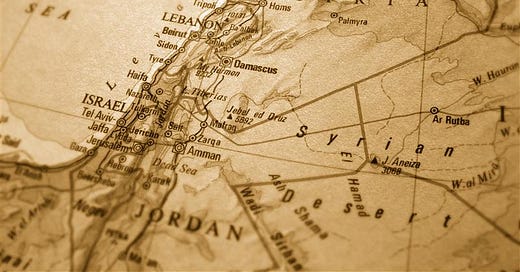President Trump, like all presidents, at least attempts to use the language of strategic ambiguity when discussing matters related to national security.
Trump said the United States “had nothing to do with the attack on Iran” after Israel launched strikes against Iran last week. He has also demanded Iran’s “unconditional surrender” and has consistently said Iran cannot obtain a nuclear weapon. Still, he has left the details of what United States will do to pursue its aims and when intentionally ambiguous to frustrate our enemies and protect America and our allies.
What is not ambiguous, however, is the history of American support for Israel. America has unambiguously and generously supported its ally Israel over 75 years across political eras and administrations.
As we report today the United States has directed $305.4 billion to Israel since 1951 (adjusted for inflation). While that amount is a very small percentage of the tens of trillions we’ve spent on our own defense and entitlement programs over 75 years, the numbers show that Israel has been our most important ally outside of NATO for many decades. While Republican administrations have given about 27 percent more in aid than Democrats ($171 billion to $134 billion) American support for Israel has been durable and bipartisan.
Of that total amount, 72 percent or $221.9 billion has gone directly to Israeli defense, and a very high percentage of that funding has gone back into the American economy. Bipartisan administrations have not been giving Israel blank checks or charity for 75 years. Defense aid comes with clear directives to purchase advanced American aircraft and munitions.
Moreover, this aid, like all aid, is subject to the fungibility principle. For instance, even though Mossad – the Israeli intelligence service – carried out the “beeper operation” against Hezbollah, American taxpayers indirectly supported that operation by freeing up Israeli resources and lowering procurement costs of other military hardware and equipment. Whether you applaud or criticize such operations, the numbers suggest we’ve played a role.
We’re highlighting these numbers now because opening the books and facilitating a reality-based debate about our relationship with allies is most important during a time of war. Iran is ruled by a regime that kills people unless they agree with the mullahs. America is ruled by “We the People” who are willing to die for their neighbor’s right to disagree with the majority. In America, public debate is a show of force to regimes who murder dissenters.
And dissenters have not been shy about dissent. While President Trump has said emphatically and consistently that Iran cannot be allowed to obtain a nuclear weapon, a vocal left-right faction argues this will lead to a “forever war” or “endless wars” or even “World War III.”
On the left, U.S. Senator Chris Van Hollen (D-MD) argues on X:
“The Netanyahu government’s decision to attack Iran only makes a very dangerous situation worse. Instead of bringing wars to an end, Trump is facilitating them — leading to civilian deaths and threatening American lives.”
Meanwhile, on the right, Tucker Carlson has said backing Israel could end Trump’s presidency and calls supporters of this policy “warmongers” who “casually encourage violence.”
Trump responded by calling Carlson “kooky.”
Trump offered a longer response to critics and on-line “influencers” in The Atlantic. He said, “Well, considering that I’m the one that developed ‘America First,’ and considering that the term wasn’t used until I came along, I think I’m the one that decides that. For those people who say they want peace – you can’t have peace if Iran has a nuclear weapon.”
Trump is partly but not entirely correct. He’s obviously the dominant figure on the right who has the loudest voice in intramural fights, but he’s a participant in a long-running debate about American foreign policy that precedes him and will continue long after he exits the scene.
The “America First” movement started in the 1930’s and argued against America’s entry into World War II. This movement later morphed into the paleoconservative faction that argued forcefully for non-interventionism. During the Reagan era and through the 1990’s, paleoconservatives like Pat Buchanan were junior members in a coalition that dialed down the nationalistic and identity politics overtones of “America First” with a subtle but distinct emphasis on putting American national security interests first.
In the 2000’s, neo-conservatives had their day during George W. Bush’s term. After the Obama years, Trump revived the “America First” banner but his policies, such as the Abraham Accords and his previous actions against Iran (i.e. assassinating Iranian General Qasem Soleimani) indicate he is not the neo-isolationist the Tucker Van Hollen coalition wants him to be.
Based on his actions, Trump has demonstrated his commitment to continuing America’s long-standing bipartisan support of Israel. He is not doing this to virtue signal, nor is he acting out of the goodness of his heart. His actions suggest he believes that by making Israel more secure, he is making America more secure. Trump will no doubt make his policy positions even more clear in coming days. Whatever direction he chooses, we’ll be ready to open the books so “We the People” can have a healthy debate about where they want their money to go.
RELATED READING
Support for Israel has a Long Bipartisan History | Open the Books | Substack | 18 June 2025







I think you miss a crucial part here. Trump has left Europe up to NATO. Instead is focused on the Orient and the Middle East for better exports. This shows in his tariff plan, but it also shows in his defense of Israel. This attack on Iran benefits the Arabs as much as Israel and the USA. Iran's time is limited. Iran simply cannot be allowed to harass the region.
Open the Books needs to do this work. It needs to drill down into how much AIPAC and other Israel supporters have spent on US politicians and compare that to how much money has flowed to Israel over various timeframes. The question of whether supporting Israel or any other country (including NATO countries) makes the US more or less safe is debatable. The flow of money is not.